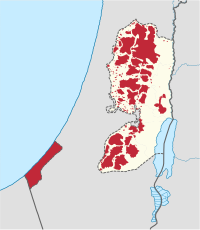 |
| Map courtesy of Wikipedia, Grey = Israel, Jordan, or Egypt Yellow = the west bank of the Jordan Red = areas under Palestinian administration (Areas A & B) |
Palestine matters too. People uprooted from their homes in 1948 when Israel became a nation still do not have equal rights in Israel today.
They live in refugee camps in Bethlehem. They live in Gaza, prisoners not allowed to leave. They live in the eastern part of Jerusalem, in Nazareth and other cities in Israel. They live on the West Bank of the Jordan River.
This is how Wikipedia begins its summary on their removal from Israel:
The 1948 Palestinian exodus, also known as the Nakba (Arabic: النكبة, al-Nakbah, literally "disaster", "catastrophe", or "cataclysm"),[1] occurred when more than 700,000 Palestinian Arabs – about half of prewar Palestine's Arab population – fled or were expelled from their homes, during the 1948 Palestine war.[2] Between 400 and 600 Palestinian villages were sacked during the war, while urban Palestine was almost entirely extinguished.[3]
When I visited Israel for the first time a year ago, many shop owners and taxi drivers asked me, "Do you love Israel?"
"Yes," I replied innocently, not quite sure what that meant. I was thrilled to see the Holy Land and get acquainted with its people.
But I talked with a hotel maid and learned that she is Palestinian, that her parents' home just north of Jerusalem was taken by Israelis in 1948, and that she grew up in a refugee camp in Bethlehem, where she still lives today, commuting into Jerusalem for work. She told me her story.
 |
| Amos Oz (photo by Michiel Hendryckx) |
I also read A Tale of Love and Darkness, the memoir of Amos Oz, a famous Israeli writer who supported justice for Palestinians, advocating a two-state solution along the 1949 border with Jordan. He's not popular among Zionists today. He was a spokesman for the Zionist left though he grew up in a prominent right-wing Zionist family. The New York Times published his opinion piece on a two-state solution in June, 2010.
I'm beginning to get a feel for what Zionism is. Now I think the question "Do you love Israel?" can sometimes mean "Do you want Israel to continue to exist? Do you support Netanyahu? Do you agree with confining Palestinians into Gaza and refugee camps?" These are complex questions to which right-wing Zionists would answer yes.
I've been following the many recent elections in Israel, always won by Bibi Netanyahu, the corrupt and very anti-Palestinian prime minister. He's a mirror image to our 45th president.
With this background, I was interested to see that Bari Weiss resigned on July 14 from her work on the Op-Ed pages of the New York Times, citing "constant bullying by colleagues who disagree with my views. They have called me a Nazi and a racist...." I read "I Stand with Bari Weiss" by one of her supporters, Jeffrey Salkin, a columnist for Religion News Service (RNS).
She describes herself as a Zionist, and that made me wonder what her position is on Palestinians and how they are treated in Israel. I searched her name and came up with evidence that she is not popular with Palestinian rights activists. For example, see this article in the Middle East Eye by Ali Harb in Washington, D.C.
Then I posted a rebuttal to Weiss and Salkin on the RNS website:
I urge you and Bari Weiss to visit the Palestinian camps in Bethlehem, to listen to people confined in Gaza. Well, maybe you can't cross the checkpoint into Bethlehem; I don't know. I would like to see more compassion for Palestinians and more support for a solution other than apartheid. I stand with Amoz Oz on this issue.
I'm sorry that Bari was scorned for "writing about the Jews again." Until anti-Semitism ends, Jews need to tell their stories and the stories of other Jews.
But it's not true that "the only ethnic issues that you can write too much about are Jewish issues." Many Americans are sick of hearing about Black issues--police violence against Blacks, Confederate statues, reparations, etc. Many Oklahomans don't want half their state run by Native Americans; other Americans don't want to give up their racist mascot names like the "Redskins." Many Americans don't want to hear that Mexico owned parts of California and Texas; they don't want to hear that Latinx people should have a right to migrate here legally.
Thank you for printing part of Bari's beautiful speech in January. Am Yisrael Chai!
I've visited Israel and listened to Palestinians as well as Jews. I've studied Hebrew for ten years at American Jewish University, LA, and read many Holocaust survivor books, some journals by those who died.
I admit, however, that I have a Christian bias. I stand with Jews who want either a two-state solution or an equal status for Palestinian Israelis in Israel.
2 comments:
Lmaooo i went to college with Bari Wiess. She was nice if a little quiet. Not the person i would have picked to become famous from our spring 2007 creative writing workshop. There were a lot of amazing stories told that semester, none of which were hers. To my knowledge the other writers in that class have yet to gain any fame or notoriety.
Very interesting that she was in your creative writing workshop in 2007. She seems to be fairly Zionist now.
Post a Comment